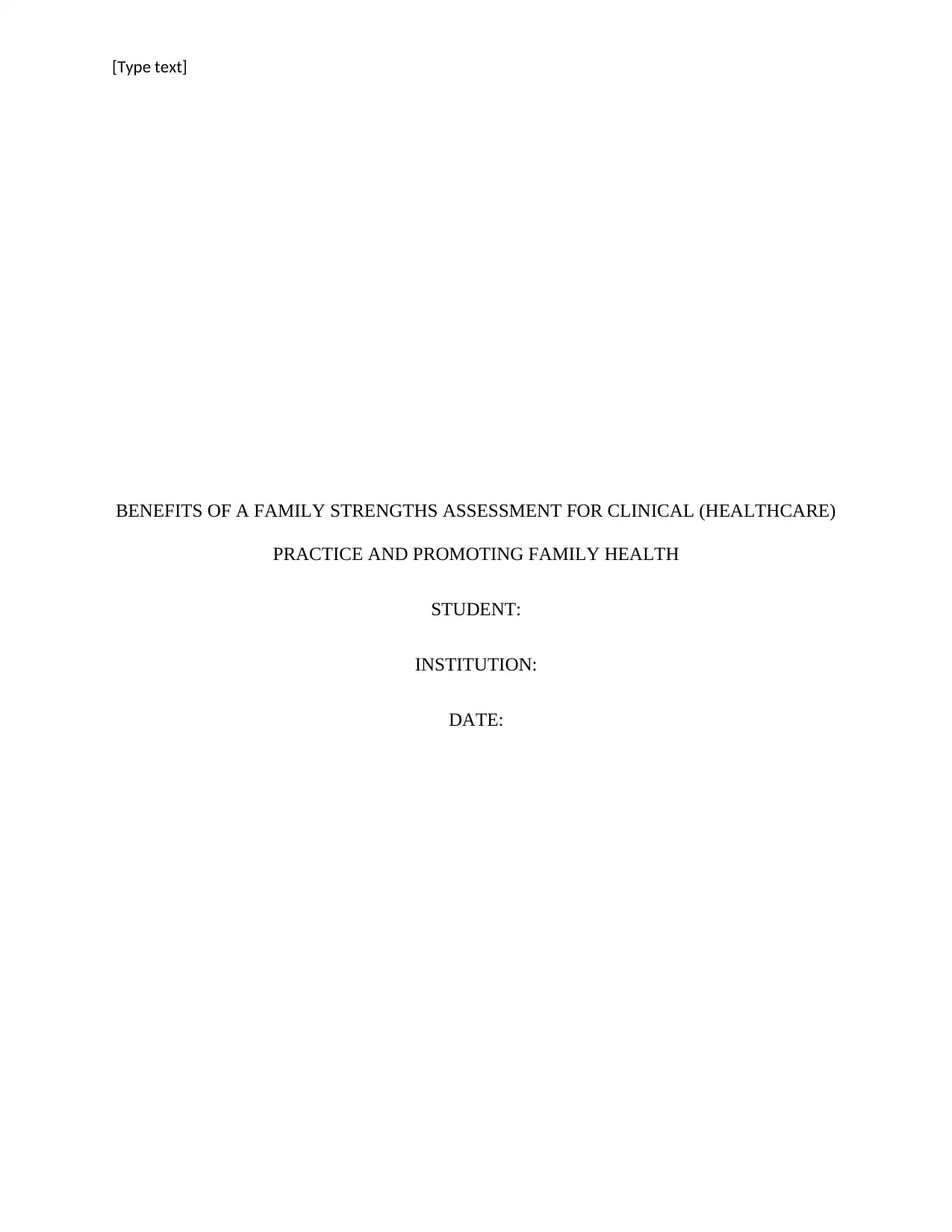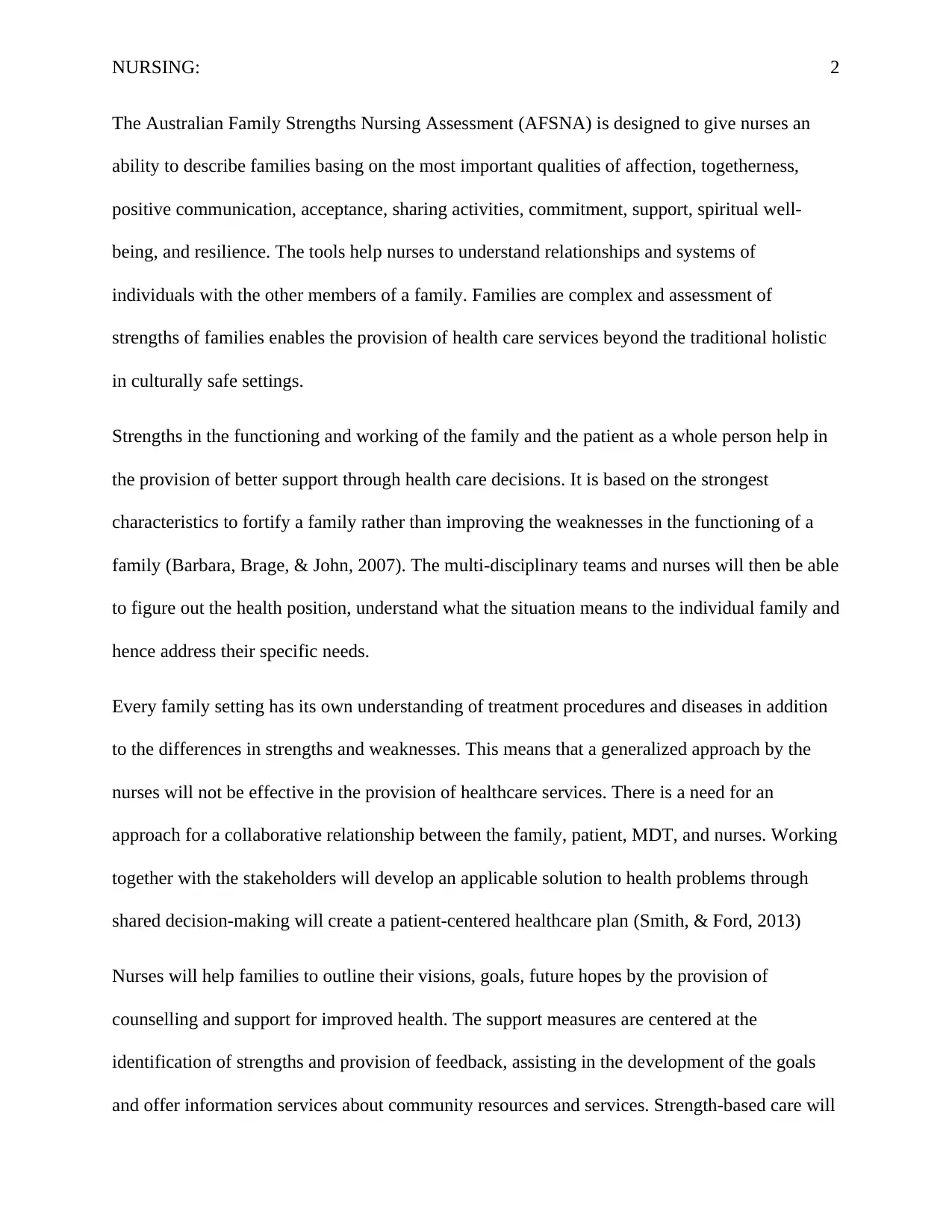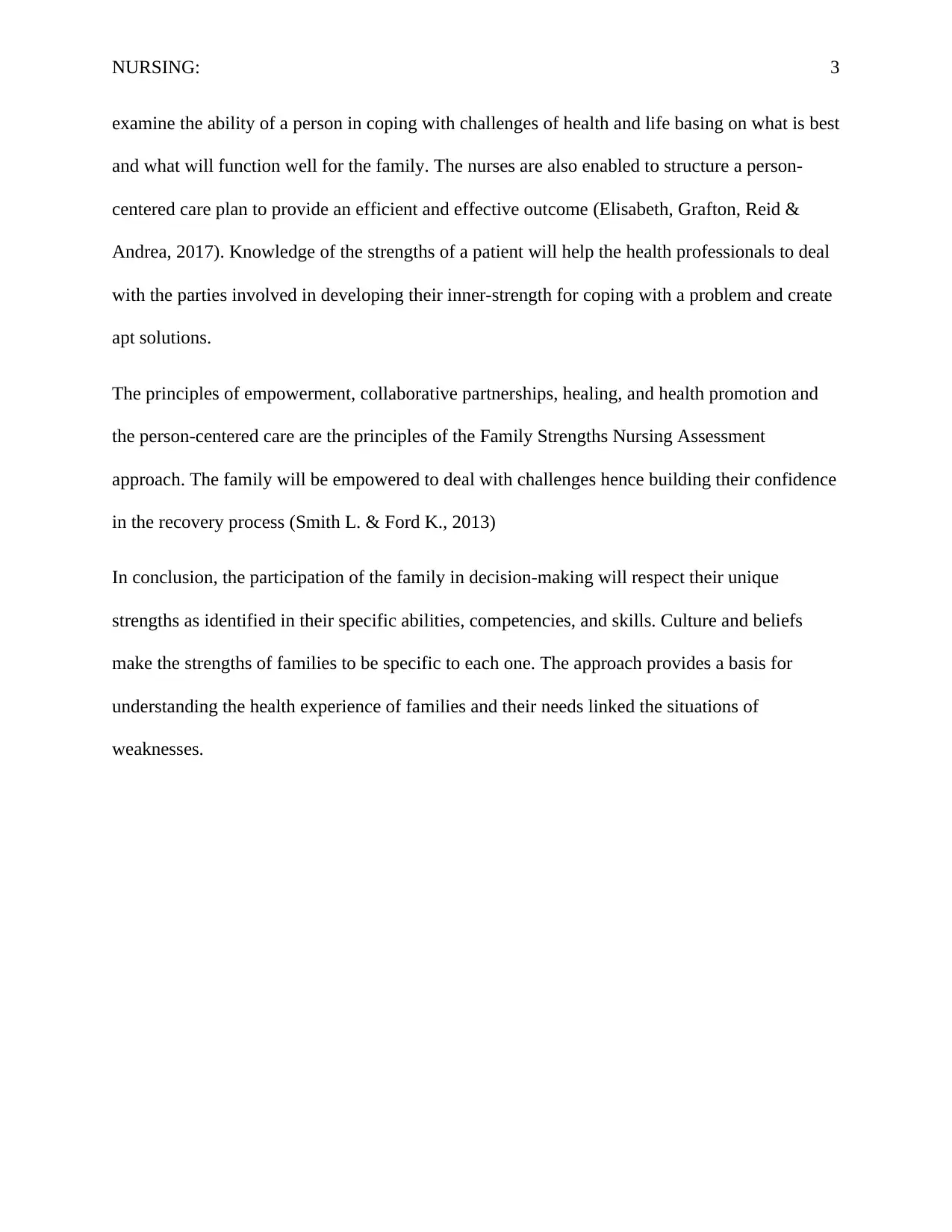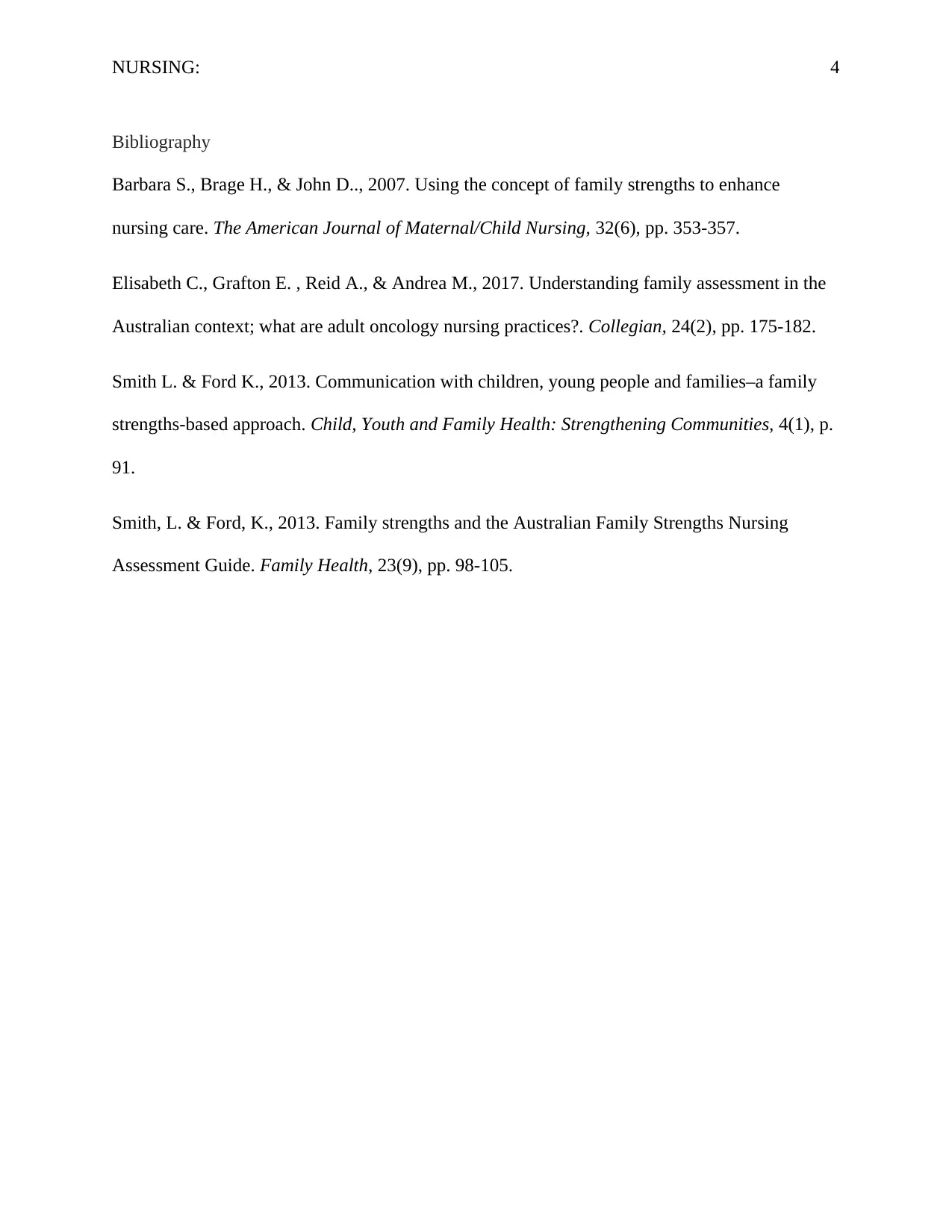Family Strengths Assessment in Nursing
VerifiedAdded on 2020/03/16
|4
|727
|659
Report
AI Summary
The report discusses the Australian Family Strengths Nursing Assessment (AFSNA) and its importance in healthcare practice. It emphasizes the need for a strengths-based approach in nursing to enhance family health and patient-centered care. By understanding family dynamics and strengths, nurses can provide better support and develop collaborative healthcare plans. The report highlights the principles of empowerment and collaboration, advocating for family involvement in decision-making to respect their unique strengths and cultural beliefs.

[Type text]
BENEFITS OF A FAMILY STRENGTHS ASSESSMENT FOR CLINICAL (HEALTHCARE)
PRACTICE AND PROMOTING FAMILY HEALTH
STUDENT:
INSTITUTION:
DATE:
BENEFITS OF A FAMILY STRENGTHS ASSESSMENT FOR CLINICAL (HEALTHCARE)
PRACTICE AND PROMOTING FAMILY HEALTH
STUDENT:
INSTITUTION:
DATE:
Paraphrase This Document
Need a fresh take? Get an instant paraphrase of this document with our AI Paraphraser

NURSING: 2
The Australian Family Strengths Nursing Assessment (AFSNA) is designed to give nurses an
ability to describe families basing on the most important qualities of affection, togetherness,
positive communication, acceptance, sharing activities, commitment, support, spiritual well-
being, and resilience. The tools help nurses to understand relationships and systems of
individuals with the other members of a family. Families are complex and assessment of
strengths of families enables the provision of health care services beyond the traditional holistic
in culturally safe settings.
Strengths in the functioning and working of the family and the patient as a whole person help in
the provision of better support through health care decisions. It is based on the strongest
characteristics to fortify a family rather than improving the weaknesses in the functioning of a
family (Barbara, Brage, & John, 2007). The multi-disciplinary teams and nurses will then be able
to figure out the health position, understand what the situation means to the individual family and
hence address their specific needs.
Every family setting has its own understanding of treatment procedures and diseases in addition
to the differences in strengths and weaknesses. This means that a generalized approach by the
nurses will not be effective in the provision of healthcare services. There is a need for an
approach for a collaborative relationship between the family, patient, MDT, and nurses. Working
together with the stakeholders will develop an applicable solution to health problems through
shared decision-making will create a patient-centered healthcare plan (Smith, & Ford, 2013)
Nurses will help families to outline their visions, goals, future hopes by the provision of
counselling and support for improved health. The support measures are centered at the
identification of strengths and provision of feedback, assisting in the development of the goals
and offer information services about community resources and services. Strength-based care will
The Australian Family Strengths Nursing Assessment (AFSNA) is designed to give nurses an
ability to describe families basing on the most important qualities of affection, togetherness,
positive communication, acceptance, sharing activities, commitment, support, spiritual well-
being, and resilience. The tools help nurses to understand relationships and systems of
individuals with the other members of a family. Families are complex and assessment of
strengths of families enables the provision of health care services beyond the traditional holistic
in culturally safe settings.
Strengths in the functioning and working of the family and the patient as a whole person help in
the provision of better support through health care decisions. It is based on the strongest
characteristics to fortify a family rather than improving the weaknesses in the functioning of a
family (Barbara, Brage, & John, 2007). The multi-disciplinary teams and nurses will then be able
to figure out the health position, understand what the situation means to the individual family and
hence address their specific needs.
Every family setting has its own understanding of treatment procedures and diseases in addition
to the differences in strengths and weaknesses. This means that a generalized approach by the
nurses will not be effective in the provision of healthcare services. There is a need for an
approach for a collaborative relationship between the family, patient, MDT, and nurses. Working
together with the stakeholders will develop an applicable solution to health problems through
shared decision-making will create a patient-centered healthcare plan (Smith, & Ford, 2013)
Nurses will help families to outline their visions, goals, future hopes by the provision of
counselling and support for improved health. The support measures are centered at the
identification of strengths and provision of feedback, assisting in the development of the goals
and offer information services about community resources and services. Strength-based care will

NURSING: 3
examine the ability of a person in coping with challenges of health and life basing on what is best
and what will function well for the family. The nurses are also enabled to structure a person-
centered care plan to provide an efficient and effective outcome (Elisabeth, Grafton, Reid &
Andrea, 2017). Knowledge of the strengths of a patient will help the health professionals to deal
with the parties involved in developing their inner-strength for coping with a problem and create
apt solutions.
The principles of empowerment, collaborative partnerships, healing, and health promotion and
the person-centered care are the principles of the Family Strengths Nursing Assessment
approach. The family will be empowered to deal with challenges hence building their confidence
in the recovery process (Smith L. & Ford K., 2013)
In conclusion, the participation of the family in decision-making will respect their unique
strengths as identified in their specific abilities, competencies, and skills. Culture and beliefs
make the strengths of families to be specific to each one. The approach provides a basis for
understanding the health experience of families and their needs linked the situations of
weaknesses.
examine the ability of a person in coping with challenges of health and life basing on what is best
and what will function well for the family. The nurses are also enabled to structure a person-
centered care plan to provide an efficient and effective outcome (Elisabeth, Grafton, Reid &
Andrea, 2017). Knowledge of the strengths of a patient will help the health professionals to deal
with the parties involved in developing their inner-strength for coping with a problem and create
apt solutions.
The principles of empowerment, collaborative partnerships, healing, and health promotion and
the person-centered care are the principles of the Family Strengths Nursing Assessment
approach. The family will be empowered to deal with challenges hence building their confidence
in the recovery process (Smith L. & Ford K., 2013)
In conclusion, the participation of the family in decision-making will respect their unique
strengths as identified in their specific abilities, competencies, and skills. Culture and beliefs
make the strengths of families to be specific to each one. The approach provides a basis for
understanding the health experience of families and their needs linked the situations of
weaknesses.
⊘ This is a preview!⊘
Do you want full access?
Subscribe today to unlock all pages.

Trusted by 1+ million students worldwide

NURSING: 4
Bibliography
Barbara S., Brage H., & John D.., 2007. Using the concept of family strengths to enhance
nursing care. The American Journal of Maternal/Child Nursing, 32(6), pp. 353-357.
Elisabeth C., Grafton E. , Reid A., & Andrea M., 2017. Understanding family assessment in the
Australian context; what are adult oncology nursing practices?. Collegian, 24(2), pp. 175-182.
Smith L. & Ford K., 2013. Communication with children, young people and families–a family
strengths-based approach. Child, Youth and Family Health: Strengthening Communities, 4(1), p.
91.
Smith, L. & Ford, K., 2013. Family strengths and the Australian Family Strengths Nursing
Assessment Guide. Family Health, 23(9), pp. 98-105.
Bibliography
Barbara S., Brage H., & John D.., 2007. Using the concept of family strengths to enhance
nursing care. The American Journal of Maternal/Child Nursing, 32(6), pp. 353-357.
Elisabeth C., Grafton E. , Reid A., & Andrea M., 2017. Understanding family assessment in the
Australian context; what are adult oncology nursing practices?. Collegian, 24(2), pp. 175-182.
Smith L. & Ford K., 2013. Communication with children, young people and families–a family
strengths-based approach. Child, Youth and Family Health: Strengthening Communities, 4(1), p.
91.
Smith, L. & Ford, K., 2013. Family strengths and the Australian Family Strengths Nursing
Assessment Guide. Family Health, 23(9), pp. 98-105.
1 out of 4
Related Documents
Your All-in-One AI-Powered Toolkit for Academic Success.
+13062052269
info@desklib.com
Available 24*7 on WhatsApp / Email
![[object Object]](/_next/static/media/star-bottom.7253800d.svg)
Unlock your academic potential
Copyright © 2020–2026 A2Z Services. All Rights Reserved. Developed and managed by ZUCOL.





